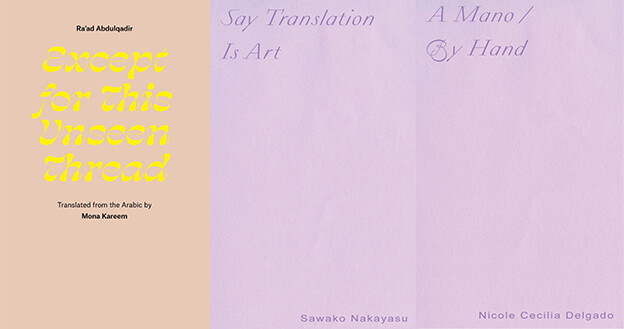
Translation as shared experience
Quinn Gruber

Quinn Gruber reviews three Ugly Duckling titles on or in translation.
Except for This Unseen Thread, Ra’ad Abdulqadir, trans. Mona Kareem (Ugly Duckling Presse, 2021)
In Except for This Unseen Thread, there is “no difference / between one cloud and another.” Refusing to register trauma as a singular event that only impacts the “I,” Abdulqadir shows how the trauma of unending war weaves itself throughout everyday life: “we are exiled at home / blindfolded with lights.” In Kareem’s translation, each word contributes to a strikingly tangible network of images that reveal the unseen thread of violence that undergirds these ordinary scenes: “the schools have gone to war” and shopowners carry “their rifles on their knees.” When ongoing trauma infuses all parts of life, we ask: “Even in this safe place / the strange clamor doesn’t stop?”
Say Translation Is Art, Sawako Nakayasu (Ugly Duckling Presse, 2020)
Say Translation Is Art celebrates translation as a vibrant and vital process: “Say translation as breathing room, say translation as breath, say translation as extension of life.” Far from an invisible practice, translation opens us to “alternative structures of literature [and] human relationships.” Translation becomes a radical act of care and community, unlimited by standards of accuracy, faithfulness, or quality. Nakayasu brings together a range of writers, translators, theorists, and poets to show how translation connects to all aspects of living and creating. In order to exist outside of oppressive structures and patterns, we must “break and rebuild everything via translation.”
A Mano / By Hand, Nicole Cecilia Delgado (Ugly Duckling Presse, 2020)
Nicole Delgado traces her journey as a poet and bookmaker in Mexico, Colombia, Guatemala, New York, and Puerto Rico in A Mano / By Hand, honoring the intimacy and community that poetry fosters. Writing and bookmaking become “project[s] of survival” in systems shaped by colonialism and inequality. A lack of institutional support for experimental literature and bookmaking makes it seem that the “natural course” of independent presses is “debt or failure.” Even so, Delgado shows us that when we dedicate ourselves to protecting small presses and other independent art spaces, they support us in turn through the communities they gather. Books themselves become “points of encounter” and “refuge for friends and young artist-writers.”